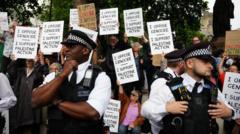What Sparked Arrests During the Palestine Action Protest?

## Understanding the Implications of the Palestine Action Ban
In recent news, more than 20 individuals were arrested in London during a protest supporting the now-banned group, Palestine Action. The Metropolitan Police confirmed these arrests amid rising tensions surrounding the group's designation under the Terrorism Act 2000. This significant shift in legal status not only criminalizes membership but also penalizes those who exhibit support for the group, highlighting the contentious nature of activism surrounding the Israeli-Palestinian conflict.
This article delves into the implications of the ban, the responses from various stakeholders, and the broader context of activism in relation to Palestine Action.
### What is Palestine Action?
Palestine Action is a group that emerged as part of the wider movement advocating for Palestinian rights. Founded by activists and campaigners, the organization has been vocal in its criticism of Israeli policies and actions in Palestine. Their methods have included direct actions such as protests, sit-ins, and other forms of civil disobedience aimed at raising awareness about the situation in Palestine.
#### Key Objectives of Palestine Action
- **Awareness Raising**: Highlighting the plight of Palestinians and advocating for their rights.
- **Direct Action**: Organizing protests and other forms of activism to challenge governmental and corporate complicity in the occupation.
- **Solidarity**: Building networks with other organizations and movements that support Palestinian rights.
### The Ban Under the Terrorism Act 2000
The legal framework under which Palestine Action was banned is the Terrorism Act 2000, a comprehensive piece of legislation that defines terrorism in the UK. The recent court ruling that upheld the ban came as a result of the group's alleged promotion of violence and disorder.
#### Implications of the Ban
1. **Criminalization of Support**: Supporting Palestine Action, whether through membership or encouragement, is now classified as a criminal offense. This can lead to severe penalties, including up to 14 years of imprisonment.
2. **Chilling Effect on Activism**: The designation could deter individuals from engaging in activism related to Palestinian rights for fear of legal repercussions.
3. **Increased Surveillance**: The ban may lead to heightened scrutiny of protests and public gatherings, as authorities monitor for any signs of support for the group.
4. **Division Among Activists**: The ruling may polarize opinions within the activist community, leading to debates about the boundaries of free speech and the right to protest.
### Public and Political Reactions
The ban has elicited mixed reactions from various sectors, reflecting the complexity of the issue.
#### Support for the Ban
Some individuals and politicians argue that the ban is a necessary measure to prevent extremism and violence. They believe that groups promoting anti-Israel sentiments can incite hatred and potentially lead to terroristic activities.
#### Opposition to the Ban
Conversely, many activists and human rights organizations assert that the ban undermines the right to free speech. They argue that advocating for Palestinian rights should not be equated with terrorism and that the ruling stifles legitimate dissent and political expression.
### The Role of Social Media in Activism
Social media plays a crucial role in modern activism, providing platforms for organizations like Palestine Action to disseminate information, mobilize support, and organize events. However, the ban complicates this landscape.
#### Benefits of Social Media for Activism
- **Increased Visibility**: Activists can reach a global audience and raise awareness about their causes.
- **Networking Opportunities**: Social media facilitates connections between like-minded individuals and organizations.
- **Real-Time Updates**: Activists can quickly share news and updates regarding protests, events, and legal matters.
#### Challenges Following the Ban
- **Censorship Concerns**: With the ban, there may be an increase in censorship and monitoring of social media posts related to Palestine Action.
- **Fear of Repercussions**: Activists may hesitate to use social media for fear of legal consequences, limiting their ability to communicate effectively.
### Navigating the Future of Activism
As the landscape of activism shifts due to legal changes, it is essential for supporters of Palestinian rights to navigate these challenges thoughtfully. Here are some strategies that can be beneficial:
1. **Educate and Inform**: Understanding the legal implications and the broader context of the conflict is crucial for effective activism.
2. **Form Alliances**: Collaborating with other organizations can amplify voices and create a more formidable front against oppression.
3. **Advocate for Legal Reforms**: Engaging in dialogue with policymakers about the implications of such bans can lead to changes in how activism is regulated.
4. **Utilize Secure Communication**: Activists can use encrypted messaging platforms to organize and communicate while minimizing the risk of surveillance.
### Conclusion
The arrest of over 20 individuals in London during a demonstration in support of Palestine Action underscores the complex interplay between activism, legality, and societal norms. As the UK navigates this contentious issue, the implications of the ban on Palestine Action will ripple through the landscape of activism, affecting not only those directly involved but also the broader discourse surrounding Palestinian rights.
In an era where activism is increasingly scrutinized, it becomes crucial for individuals to engage thoughtfully and strategically. The future of activism for Palestinian rights, and indeed for all forms of dissent, may depend on how effectively supporters can adapt to these new legal realities.
### Frequently Asked Questions
#### What is Palestine Action?
Palestine Action is an activist group that advocates for Palestinian rights and highlights issues related to the Israeli-Palestinian conflict through protests and direct actions.
#### Why was Palestine Action banned?
Palestine Action was banned under the Terrorism Act 2000 due to allegations of promoting violence and disorder, leading to significant legal implications for its supporters.
#### What are the penalties for supporting Palestine Action?
Supporting Palestine Action, whether through membership or public endorsement, is now classified as a criminal offense, which could result in penalties of up to 14 years in prison.
#### How does this ban affect activism in general?
The ban may create a chilling effect on activism, deterring individuals from speaking out or participating in protests related to Palestinian rights for fear of legal repercussions.
#### What can activists do in response to the ban?
Activists can educate themselves and others, form alliances with like-minded organizations, and engage in advocacy for legal reforms to ensure that their rights to protest and express dissent are protected.
In light of these developments, how do you think activists can adapt their strategies in response to increasing legal restrictions on free speech?
#PalestineAction #Activism #HumanRights
Published: 2025-07-05 14:38:15 | Category: technology



